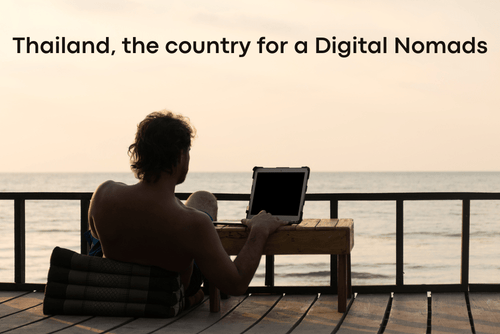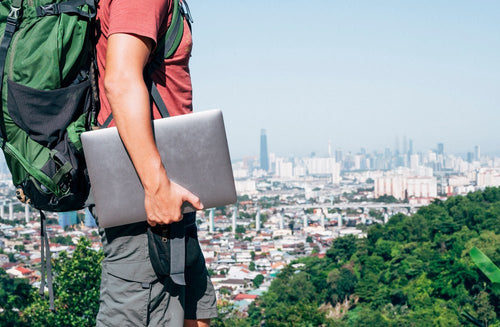Thailand is an awesome place that many digital nomads love. It has everything you need to work remotely, from affordable living costs and stunning beaches to a lively culture that is sure to keep you entertained.
There are plenty of places to work from, including co-working spaces, cafes, and accommodations that cater to remote workers. Plus, the locals are super friendly, and the weather is always perfect, which makes it a paradise for anyone looking to work and have a great time.
Whether you prefer the hustle and bustle of Bangkok or the laid-back vibes of Phuket and Koh Samui, you'll find the perfect balance of work and leisure in Thailand.
Digital Nomading: An Overview and Thailand's Appeal

Digital nomads are remote workers who use electric devices to work from anywhere in the world. They are often drawn to Thailand for its low cost of living, warm climate, and friendly people. Thailand is also a great place to find reliable internet and co-working spaces, making it an ideal destination for digital nomads of all experience levels.
Benefits of Digital Nomading in Thailand
- Low cost of living: Thailand is one of the most affordable countries in Southeast Asia, making it an excellent option for budget-minded digital nomads. You can easily find comfortable accommodation and delicious food for a fraction of what you would pay in Western countries.
- Warm climate: Thailand has a tropical climate year-round, with average temperatures ranging from 22 to 34 degrees Celsius. This makes it a great place to escape the cold winters of the Northern Hemisphere.
- Friendly people: Thais are known for their hospitality and warm smiles. You're sure to make new friends and feel welcome in Thailand.
- Reliable internet and co-working spaces: Thailand has good internet speeds and a growing number of co-working spaces, making it easy to stay connected and productive while working remotely.
Challenges of Digital Nomading in Thailand
- Language barrier: Thai is the official language of Thailand, and it can be difficult to get by without speaking at least a few basic phrases. However, many Thais speak English, especially in popular tourist areas.
- Culture shock: Thailand has a unique culture and way of life. It can take some time to adjust to the different customs and expectations. However, being open-minded and respectful will go a long way.
- Visas: Digital nomads need to obtain a valid visa to stay in Thailand for more than 30 days. Several different visa options are available, so be sure to research the best one for your needs.
Bangkok: Ideal for Digital Nomads Seeking Accommodation, Co-Working Spaces, and Networking Opportunities

Bangkok is Thailand's capital and largest city, and it's a great place for digital nomads to start their journey. There is a wide variety of accommodation options, from budget hostels to luxury hotels. Bangkok has many excellent co-working spaces, including Hubba Bangkok and Spaces Thonglor.
In addition, Bangkok is a great place to network with other digital nomads and remote workers. Several events and meetups are held throughout the city each week.
Chiang Mai: The Digital Nomad Capital of Thailand

Chiang Mai is a city in northern Thailand known for its relaxed atmosphere, beautiful temples, and affordable cost of living. It's a popular destination for digital nomads, and you can work remotely in many co-working spaces and cafes. Chiang Mai is also great for learning about Thai culture and language. There are a number of cooking schools and language schools in the city.
Thailand Digital Nomad Tips: Cultural Awareness, Health and Safety, and Budgeting Advice

When visiting Thailand, it's important to be respectful of Thai culture and customs. Dress modestly when visiting temples, and avoid speaking loudly or making public displays of affection. It's also important to learn a few basic Thai phrases, such as "hello," "thank you," and "goodbye." This will show that you're making an effort to respect the local culture.
Thailand is a relatively safe country to travel in, but it's important to be aware of your surroundings and take precautions to avoid getting sick. Be sure to drink bottled water and eat cooked food. It's also a good idea to get vaccinated against hepatitis A and B and typhoid fever. If you do get sick, there are a number of good hospitals and clinics in Thailand. Be sure to purchase travel insurance before you go so that you're covered for medical expenses.
Thailand is a very affordable country, but it's still important to budget your money wisely. When creating your budget, consider the cost of accommodation, food, transportation, and activities. There are many ways to save money in Thailand, such as eating at street food stalls and taking public transportation. You can also save money on accommodation by staying in a hostel or guesthouse.

Additional Tips for Digital Nomads in Thailand
- Get a Thai SIM card: This will give you access to cheap mobile internet and local phone calls.
- Use Grab or Bolt: These ride-hailing apps are very popular in Thailand. They're a convenient and affordable way to get around.
- Learn a few basic Thai phrases: This will help you communicate with locals and get around more easily.
References:










